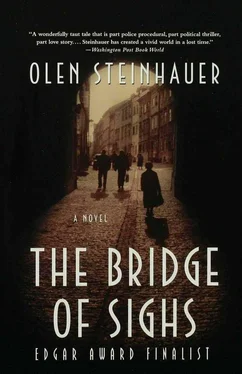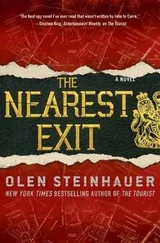Olen Steinhauer - The Bridge of Sights
Здесь есть возможность читать онлайн «Olen Steinhauer - The Bridge of Sights» весь текст электронной книги совершенно бесплатно (целиком полную версию без сокращений). В некоторых случаях можно слушать аудио, скачать через торрент в формате fb2 и присутствует краткое содержание. Жанр: Политический детектив, на английском языке. Описание произведения, (предисловие) а так же отзывы посетителей доступны на портале библиотеки ЛибКат.
- Название:The Bridge of Sights
- Автор:
- Жанр:
- Год:неизвестен
- ISBN:нет данных
- Рейтинг книги:3 / 5. Голосов: 1
-
Избранное:Добавить в избранное
- Отзывы:
-
Ваша оценка:
- 60
- 1
- 2
- 3
- 4
- 5
The Bridge of Sights: краткое содержание, описание и аннотация
Предлагаем к чтению аннотацию, описание, краткое содержание или предисловие (зависит от того, что написал сам автор книги «The Bridge of Sights»). Если вы не нашли необходимую информацию о книге — напишите в комментариях, мы постараемся отыскать её.
The Bridge of Sights — читать онлайн бесплатно полную книгу (весь текст) целиком
Ниже представлен текст книги, разбитый по страницам. Система сохранения места последней прочитанной страницы, позволяет с удобством читать онлайн бесплатно книгу «The Bridge of Sights», без необходимости каждый раз заново искать на чём Вы остановились. Поставьте закладку, и сможете в любой момент перейти на страницу, на которой закончили чтение.
Интервал:
Закладка:
Emil moved ink bottles to the deep side drawer that moaned when he pulled. Stacked crisp, white sheets on the corner of the desk. Placed department stamps in the accessible wide-top drawer-easily accessible because Grandfather had said that a man with stamps is a man with power.
He was pleased that his father’s scuffed watch, which he examined minute by minute, matched his new, weathered look.
From the administrative buildings on the opposite side of the street, sounds of revelry reached them. A celebration, punctuated by shouts and breaking glass. Emil gazed out the open window, but from his angle could only see a top floor of windows, and blue summer sky.
He was becoming adept at using his peripheral vision, seeing what was not directly seen. The chief, again, was nowhere. The state security inspector was making notes in a file. The fat one was eating sunflower seeds this time, the green flecks of yesterday s pumpkin seeds still visible beneath today’s black shards. Leonek Terzian read a book-Emil couldn’t make out the mysterious, squiggly characters on the cover.
There was no telling what their reasons were. He tried, but came up with nothing of use. Hazing no longer seemed possible. Did they think he was a spy in their midst? A visitor from Moscow? Maybe from a family they disliked-this was still the old world, and family animosities went on and on.
Or maybe it was his face. Unscarred, inexperienced. He stroked his sore, scratched skin. Maybe they hated to see how far they had come from their own honest boyhoods.
It was well into morning when he realized-late, it seemed to him-that he was the only one without a typewriter. His white paper was lined up evenly with the corner of his desk, useless and clean.
“Supply room?” he asked the air. “Anyone tell me where it is?”
The tired answer of bald scalps and messy heads of dense hair. The snap of typewriter keys.
The security officer’s stone face turned from the wall to meet his gaze-Emil could read nothing in those heavy, sleepless eyes-and nodded in the direction of the door.
Light reflected in the corridor, footsteps ricocheting, and up ahead a white-scarved woman dragged a damp mop. Uniformed Militia stood in pairs, talking and laughing-their shoulder patches matched the one on his dress uniform at home: the red hawk with head in profile, wings folded, on a field of yellow.
This was another world. Some smiled at him as they passed, and a few even nodded cursorily. He read what was stenciled on each door s translucent glass: accounts and external and munitions and toilet and interview. A mousy secretary coming out of the interview room with a notebook to her chest smiled at him. Her eyes twinkled.
The corridor turned left, then right, and at the far end, upon cracked glass, was supplies. He rapped with a loose knuckle, then entered.
A thin, tanned man wearing blue coveralls leaned back in a chair, reading The Spark — yesterdays afternoon edition- drowsily. His sockless, pale ankles were crossed on the counter, his black shoes polished. Behind him, seven overflowing, gray shelving units led to the dim far wall.
“Comrade,” said the thin man as he dropped his feet. “You are to be congratulated. Says right here that the murder rate in the Capital has plummeted fifty percent in the last three months.” He slapped the paper with the back of his hand. “It thanks you.”
Emil closed the door. “Me?”
His smile was rich with yellow teeth. Emil couldn’t place the accent. The man’s bloodshot left eye remained trained on the small side window. “You, yes! Figuratively, at least. All the Comrade Inspectors of the People’s Militia.”
This sudden end to the silence stunned him. He opened his mouth. The end of the silence and its form: a deeply creased, tanned face with a lazy red eye. “Not this inspector,” said Emil. “Only my second day.”
“Then don’t send the rate back up.”
Emil propped himself with wide-set arms against the counter. He was acclimating to conversation. “Do you have a typewriter?”
“Your very lucky day.” The supply clerk smiled, wiping sweat out of his day-length beard. He wandered back into the darkness-his slight limp was apparent beside the hard, vertical lines of the shelves-and returned with an old monstrosity, weaving a little, gasping as he dropped it on the counter. “Beautiful,” he said, and swallowed. “No?”
It looked less like a typewriter than a cumbersome piece of steel furniture.
“You cant go wrong with a classic. German. Weimar, no less.”
Emil touched it timidly. “It works?” It was cold.
“Mostly, sure. Except the J, and the apostrophe. And, if I remember-” He pressed a button that clattered loudly, then squinted his strong eye at the black impression on the black roller. “Yes-the B.”
Emil exhaled. “You have something that works?”
A cool look of judgment filled the clerk’s features. “I shouldn’t do this.” He moved with exaggerated labor, his limp almost a stumble, back into the gloom. One hand fondled his chin, and the other held his backside as he frowned at shelves.
Emil wandered to the muddy, face-high window that looked down on a concrete courtyard, thinking again what he’d thought when he returned after the war: This is a nation of cripples. Dirty officers’ children played soccer in the courtyard, their shouts muted by glass. A cool tickle of sweat drew down his back. Then something hit the counter.
This typewriter was small, virtually new, and all its keys were intact. The clerk tested them with a light finger.
“Is better?”
“Significantly.” Emil lifted it easily with two hands.
“Is worth something, no?”
He set it down again, and waited.
“The last one that went out,” said the clerk, his brown features paling in the square of light from the window, “went for, I believe, five koronas.”
“Five?”
“But you’re new, right? And, after all, this one used to be at your desk.” He talked a quick retreat. “Sergei’s replacement, correct? I thought so. Exactly. Must be fair,” he said, then gazed at the scratched counter. “Poor Sergei.”
The other cadets had eagerly told Emil the rumor of the man he was replacing: Sergei Lvonic had been shot by a 7.62mm Tokarev. A Red officer’s pistol. But like most things that occurred just after the Liberation, it was never investigated.
“What about you?” asked Emil. “Can I know who you are?”
The clerk shrugged. “Roberto.”
“Spain?”
“Everyone thinks that.” He shook his head. “I get points for the Franco martyrs-the girls think I’ve lost my family to the fascists. But no. Argentinian.” He placed a hand over his chest and intoned: “My parents knew the way of their hearts.” The hand dropped and he winked.
Emil leaned closer. “So you know who I am?”
“Who doesn’t? Brod, Emil. Homicide.”
“Then maybe you can explain it to me.”
“Explain what, Comrade?”
That word dropped a curtain between them, as though Roberto had suddenly reached the limits of his affability and was backing up again. “The men,” said Emil. “They hate me. I don’t know why. They don’t speak to me, and there’s been some violence.”
Roberto snorted, impressed. “Violence?” He wiped his damp cheek with a thumb and settled into his chair. “Sergei was loved. You can be sure of that.” He took a pack of Czech cigarettes from his pocket and shook one out. “There weren’t many like Sergei.” He puffed as he lit up. “Don’t worry, they’ll get over it. What they are are…victims of melancholia.”
“After two years? This is melancholy? Someone hits me in the balls, and that’s just melancholy?”
Roberto shrugged in his tired way; none of this was news to him. “Just wait until you see those men really angry.”
Читать дальшеИнтервал:
Закладка:
Похожие книги на «The Bridge of Sights»
Представляем Вашему вниманию похожие книги на «The Bridge of Sights» списком для выбора. Мы отобрали схожую по названию и смыслу литературу в надежде предоставить читателям больше вариантов отыскать новые, интересные, ещё непрочитанные произведения.
Обсуждение, отзывы о книге «The Bridge of Sights» и просто собственные мнения читателей. Оставьте ваши комментарии, напишите, что Вы думаете о произведении, его смысле или главных героях. Укажите что конкретно понравилось, а что нет, и почему Вы так считаете.












